|
Books Should Be Free Loyal Books Free Public Domain Audiobooks & eBook Downloads |
|
|
Books Should Be Free Loyal Books Free Public Domain Audiobooks & eBook Downloads |
|
Humorous Books |
|---|
|
Book type:
Sort by:
View by:
|
By: Carroll Watson Rankin (1864-1945) | |
|---|---|
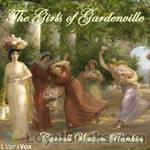 The Girls of Gardenville
The Girls of Gardenville
It is pleasant to have another book about a group of merry, natural girls, who have the attractions of innocence and youthful faults. "The Sweet Sixteen" Club made fudge, and went on picnics, and behaved just as jolly, nice maidens should. (The Outlook, vol. 82, Mar. 24, 1906) | |
By: Barry Pain (1864-1928) | |
|---|---|
 Eliza
Eliza
A gentle, yet deliciously humourous series of anecdotes following the life of the main character and his wife, Eliza. | |
By: Richard Marsh (1857-1915) | |
|---|---|
 Amusement Only
Amusement Only
This is a collection of 12 short stories of mystery and humor, which are, as the title says, for amusement only. | |
By: A. A. Milne (1882-1956) | |
|---|---|
 The Sunny Side
The Sunny Side
The Sunny Side is a collection of short stories and essays by A. A. Milne. Though Milne is best known for his classic children's books, especially Winnie The Pooh, he also wrote extensively for adults, most notably in Punch, to which he was a contributor and later Assistant Editor. The Sunny Side collects his columns for Punch, which include poems, essays and short stories, from 1912 to 1920. Wry, often satirical and always amusingly written, these pieces poke fun at topics from writing plays to lying about birdwatching. They vary greatly in length so there is something for everyone. | |
By: Arnold Bennett (1867-1931) | |
|---|---|
 Self and Self-management: Essays about Existing
Self and Self-management: Essays about Existing
Bennett's essays always provide food for thought and bring a wry smile to the lips. Human nature, it appears, changes little over the ages, and Bennett's writing stands the test of time, though in the case of some of the essays in this eclectic collection, it is well to remember that they were written at the time of the First World War and the fight for women's suffrage. | |
By: Ellis Parker Butler (1869-1937) | |
|---|---|
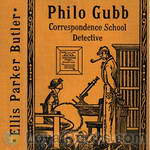 Philo Gubb, Correspondence-School Detective
Philo Gubb, Correspondence-School Detective
Philo Gubb, not being content with his job as wallpaper-hanger, has higher aspirations: to become a detective, just like Sherlock Holmes. To that end, he enrolls in a correspondence course, where he gets lessons through the mail as well as the necessary disguises for a detective. Philo Gubb, not being really clever or intuitive, or even looking good in those disguises, gets involved in one case after the other - and sooner or later happens to stumble on and solve the crime... Each of these stories... | |
By: Saki (1870-1916) | |
|---|---|
 The Toys of Peace
The Toys of Peace
This is the fifth collection of short stories by Saki (H.H. Munro), and was published posthumously in 1923. Even so, many of the stories are quite up to the standard of those collected earlier. | |
By: Richard Harding Davis (1864-1916) | |
|---|---|
 The Make-Believe Man
The Make-Believe Man
Adventure was what our protagonist was looking for, when he boarded the steamer "Patience" for his holiday, and when one has a man with such a vivid imagination like Joseph Forbes Kinney as a travel companion, who seems to find adventures at every turn of the road (and if not, he manufactures them), the two travellers are sure to stumble into trouble... | |
By: Various | |
|---|---|
 The Jargon File, Version 4.2.2, 20 Aug 2000
The Jargon File, Version 4.2.2, 20 Aug 2000
| |
By: G. K. Chesterton (1874-1936) | |
|---|---|
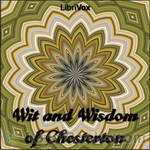 Wit and Wisdom of Chesterton
Wit and Wisdom of Chesterton
In this collection, Bevis Hillier has put together some of Chesterton's essays in "The Defandant", "Varied Types" and "Tremendous Trifles". These 12 pieces were chosen to giving a peek into the margins of Chesterton's work and give a sense of the distinctive flavor of his mind. They were also chosen with an eye to showing what a complex and fascinating character he was. | |
By: Thomas Hardy (1840-1928) | |
|---|---|
 The Hand of Ethelberta
The Hand of Ethelberta
Ethelberta was raised in humble circumstances but became a governess and consequently, at the age of 18, married well. However, her husband died two weeks after the wedding. Her father-in-law, Lord Petherwin, died shortly afterwards. Ethelberta (now 21) lives with her mother-in-law, Lady Petherwin. In the three years that have elapsed since her marriage, Ethelberta has been treated to foreign travel and further privileges by Lady Petherwin but restricted from seeing her own family. The story follows Ethelberta's career as a famous poetess and storyteller... | |
By: Joel Chandler Harris (1845-1908) | |
|---|---|
 Uncle Remus Returns
Uncle Remus Returns
Uncle Remus tells these 11 stories but to the son of the original "little boy" who is visiting his grandmother on the plantation. As always Uncle Remus can be relied upon to provide funny and pointed insight into human personalities through his story telling. These were all published in the Uncle Remus magazine from 1905 and 1906 and gathered together in this book by the author. Note that these stories are reflections of another period in time and some of the language used would definitely be considered rude and/or offensive now. In keeping with the desire to present the text as the author wrote it, nothing has been changed or edited. | |
By: A. A. Milne (1882-1956) | |
|---|---|
 Once a Week
Once a Week
A collection of short stories by famed Winnie the Pooh author, A.A. Milne. This charmingly humorous work from Milne's earlier writing period was first published in Punch magazine. | |
By: Arnold Bennett (1867-1931) | |
|---|---|
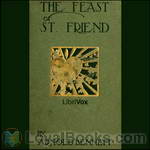 The Feast of St. Friend
The Feast of St. Friend
In The Feast of St. Friend, a Christmas book, Arnold Bennett shares his views on Christmas as the season of goodwill. As always, Bennett's writing includes some thought-provoking ideas liberally spiced with his wry sense of humour, and as always too, you can barely believe it was written so long ago. This was published exactly 100 years ago, in 1911. (Introduction by Ruth Golding) | |
By: Dorothy Canfield Fisher (1879-1958) | |
|---|---|
 The Bent Twig
The Bent Twig
Semi-autobiographical series of incidents in the life of an intellectual American family in the late 19th - early 20th Century as seen by favored daughter, Sylvia Marshall. Her father is an economics professor in a Midwestern state university and she is following in his inquisitive footsteps. Canfield writes this in a matter-of-fact manner with Tarkingtonesque good humor. | |
By: Cal Stewart (1856-1919) | |
|---|---|
 Uncle Josh's Punkin Centre Stories
Uncle Josh's Punkin Centre Stories
A collection of comedic short stories from the perspective of an old country man. | |
By: A. A. Milne (1882-1956) | |
|---|---|
 Not That It Matters
Not That It Matters
More of the witty, wry, and deliciously wicked essays and articles written by Milne. Most people know him as the creator of Winnie The Pooh, but he worked for many years as editor of Punch Magazine and these are some of his best. Not That It Matters is a collection of over 40 of these short stories and articles. Not That It Matters collects his columns for Punch, which include poems, essays and short stories, from 1912 to 1920. Most of his writing pokes fun, both gentle and not so gentle at a variety of topics... | |
By: George Horace Lorimer (1869-1937) | |
|---|---|
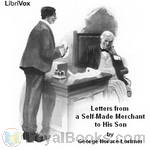 Letters from a Self-Made Merchant to His Son
Letters from a Self-Made Merchant to His Son
Being the Letters written by John Graham, Head of the House of Graham & Company, Pork-Packers in Chicago, familiarly known on 'Change as "Old Gorgon Graham," to his Son, Pierrepont, facetiously known to his intimates as "Piggy." George Horace Lorimer was an American journalist and author. He is best known as the editor of The Saturday Evening Post. | |
By: Christopher Morley (1890-1957) | |
|---|---|
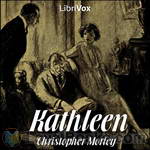 Kathleen
Kathleen
A group called the Scorpions, eight Oxford undergraduates, find a letter Kathleen wrote a letter to Joe at Oxford. They build up an image of Kathleen and Joe from the letter and set out to find and meet Kathleen. The competition between them leads to many entertainingly funny scenarios. | |
By: Stephen Leacock (1869-1944) | |
|---|---|
 My Discovery of England
My Discovery of England
"In the course of time a very considerable public feeling was aroused in the United States and Canada over this state of affairs. The lack of reciprocity in it seemed unfair. It was felt (or at least I felt) that the time had come when some one ought to go over and take some impressions off England. The choice of such a person (my choice) fell upon myself. By an arrangement with the Geographical Society of America, acting in conjunction with the Royal Geographical Society of England (to both of whom I communicated my proposal), I went at my own expense."And from thence follow the impressions of Canadian political economist and humourist, Stephen Leacock, after a lecturing visit to England. | |
By: Agnes Repplier (1855-1950) | |
|---|---|
 In Our Convent Days
In Our Convent Days
With her usual wit and charm, Ms. Repplier recalls her days at Eden Hall, the Convent of the Sacred Heart in Torresdale, north of Philadelphia. She shares the highlights (and some of the low lights) of her time there. Perhaps this sharp eye, nurtured by her willfulness and independent spirit, was the reason she was not invited to return to Eden after her second year. Not only Catholics or boarding school alumnae will find this book entertaining; anyone who went to school or who looks back on their childhood will see their own experience somewhere in this memoir. | |
By: Imogen Clark | |
|---|---|
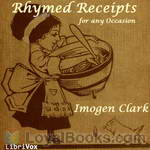 Rhymed Receipts for Any Occasion
Rhymed Receipts for Any Occasion
In addition to being amusing, recipes written in a poetic form were easy to remember and used as learning tools for the young housekeeper. Many of the poems in this 1912 publication were originally published in Woman's Home Companion, Good Housekeeping Magazine, the Housewife, Table Talk, and the Boston Cooking School Magazine. | |
By: James Thomson (1834-1882) | |
|---|---|
 Satires and Profanities
Satires and Profanities
"Believing as I do that James Thomson is, since Shelley, the most brilliant genius who has wielded a pen in the service of Freethought, I take a natural pride and pleasure in rescuing the following articles from burial in the great mausoleum of the periodical press. There will doubtless be a diversity of opinion as to their value. One critic, for instance, has called “The Story of a Famous Old Jewish Firm” a witless squib; but, on the other hand, the late Professor Clifford considered it a piece of exquisite mordant satire worthy of Swift... | |
By: Washington Irving (1783-1859) | |
|---|---|
 Letters of Jonathan Oldstyle, Gent.
Letters of Jonathan Oldstyle, Gent.
The Letters of Jonathan Oldstyle, Gent. (1824) is a compilation of eight humorous and observational letters written by American writer, Washington Irving, under the pseudonym, Jonathan Oldstyle. These eight letters and one additional were first published as a series of "Letters to the Editor" of the New York paper, The Morning Chronicle, between 1802 and 1803. In them Oldstyle skewered the local New York social scene on the topics of etiquette, marriage, fashion, and other particulars of human interaction... | |
By: Saki (1870-1916) | |
|---|---|
 Unbearable Bassington
Unbearable Bassington
The Unbearable Bassington was the first novel written by Saki (H. H. Munro). It also contains much of the elegant wit found in his short stories. Comus (The Unbearable) Bassington, is a charming young man about town. His perversity however thwarts all his mother’s efforts to advance his prospects and lands him in hot water. Like many a “black sheep” he ends up being sent off to one of the colonies to fend for himself. This book showcases Saki’s wonderful writing and that ability to be so very funny and terribly sad at the same time. | |
By: Various | |
|---|---|
 The Book of Anecdotes and Budget of Fun; containing a collection of over one thousand of the most laughable sayings and jokes of celebrated wits and humorists.
The Book of Anecdotes and Budget of Fun; containing a collection of over one thousand of the most laughable sayings and jokes of celebrated wits and humorists.
| |
By: Unknown (1818-1854) | |
|---|---|
 The Humors of Falconbridge A Collection of Humorous and Every Day Scenes
The Humors of Falconbridge A Collection of Humorous and Every Day Scenes
| |
By: Various | |
|---|---|
 The Jargon File, Version 4.0.0, 24 Jul 1996
The Jargon File, Version 4.0.0, 24 Jul 1996
| |
By: Anonymous | |
|---|---|
 Jokes For All Occasions
Jokes For All Occasions
JOKES FOR ALL OCCASIONSPREFACEThe ways of telling a story are as many as the tellers themselves. It is impossible to lay down precise rules by which any one may perfect himself in the art, but it is possible to offer suggestions by which to guide practise in narration toward a gratifying success. Broadly distinguished, there are two methods of telling a story. One uses the extreme of brevity, and makes its chief reliance on the point. The other devotes itself in great part to preliminary elaboration in the narrative, making this as amusing as possible, so that the point itself serves to cap a climax... | |
By: George Calderon (1868-1915) | |
|---|---|
 Cinderella
Cinderella
If you are expecting glass slippers and pumpkin coaches, look elsewhere... This is "a pantomime as Ibsen would have written it, if only it had occurred to him to write one." Set on a "bleak and cheerless heath overlooking the fjord" we meet Ibsenesque heroine Mrs. Inquest, her step-daughter Hilda, and her daughter Hedda, who is engaged to be married to the unfortunate Tesman. Thus begins Calderon's hilarious Ibsenesque version of Cinderella. NOTE from the editor of the volume, published in 1922 after Calderon's death: This play is hardly more than a rough draft, written when the idea was fresh and put aside to be worked on when the right moment should come... | |
By: Robert Jones Burdette (1844-1914) | |
|---|---|
 Chimes From A Jester’s Bells
Chimes From A Jester’s Bells
Part I. The Story of Rollo; Mr. Holliday knows all there is to know about raising children, or at least he thinks he does. His attempts to train his son, Rollo, "in the way he should go," are well-meant, but hilariously unsuccessful--or are they? I believe this is a sort of spoof of the “Rollo” series for children, that was written by Jacob Abbot in the mid 19th century. The characters have the same names and the chapters have a little Q&A at the end like the Abbot books, except these are definitely tongue-in-cheek... | |
By: Allan Monkhouse (1858-1936) | |
|---|---|
 Mary Broome
Mary Broome
Before Downton Abbey, there was Mary Broome. In Allan Monkhouse's 1911 satire, when the son of a middle-class household gets their housemaid pregnant, the two families must try to combine their very different values. | |
By: Emily Eden (1797-1869) | |
|---|---|
 Semi-Attached Couple
Semi-Attached Couple
Young and beautiful Helen Eskdale and fabulously wealthy Lord Teviot seem to be the perfect match. But when they marry, they find that misunderstandings and jealousies continually drive them apart. The machinations and intrigues of a large supporting cast surround the central question of whether their marriage will survive. Emily Eden's comedy of manners is reminiscient of Jane Austen's witty and ironic novels. | |
By: Arthur W. Marchmont (1852-1923) | |
|---|---|
 Dash for a Throne
Dash for a Throne
The young Count von Rudloff got himself into so much trouble with the Imperial Family in Berlin, that he sees no other way out of it than to fake his own death. Stumbling through different identities, he finally assumes - quite against his will - the identity of the Prince von Gramberg. At Gramberg Castle, he finds a web of intrigue, which threatens the safety of the young and beautiful Countess Minna. The Count von Rudloff decides to save the girl, but the intrigue is more complicated than it first appeared, and there are old enemies who are still waiting for their revenge... | |
By: St. John Emile Clavering Hankin (1869-1909) | |
|---|---|
 Mr. Punch's Dramatic Sequels
Mr. Punch's Dramatic Sequels
A collection of short and humorous one-act "sequels" to 14 major plays (many already in the catalog). Plays end too soon. They never show the whole of what I want to know. The curtain falls and I'm perplexed with doubts about what happened next. Did HAMLET'S father haunt no more the battlements of Elsinore? Does LADY TEAZLE never call at LADY SNEERWELL'S now at all? Was BENEDICK'S a happy marriage? And will the MELNOTTES keep a carriage? Will AUBREY take to wife one day another MRS. TANQUERAY? Do ECCLES and his stepson wrangle? Has anything been heard of DANGLE? What has become of MRS... | |
By: C. J. Dennis (1876-1938) | |
|---|---|
 Ruined Reversolet
Ruined Reversolet
LibriVox volunteers bring you 16 recordings of A Ruined Reversolet by C. J. Dennis. This was the Weekly Poetry project for October 28, 2012.Clarence James Dennis was an Australian poet and journalist. In his varied career, he worked as a barman, shearer, solicitor's clerk, newspaper proprietor and (as do many Australians) a civil servant, before settling down in a rural retreat at Toolangi, in the Dandenong Ranges, east of Melbourne.His most famous work is "The Songs of a Sentimental Bloke", a verse novel written in an Australian vernacular and first published in 1915... | |
By: Mark Twain (1835-1910) | |
|---|---|
 Mark Twain’s Journal Writings, Volume 2
Mark Twain’s Journal Writings, Volume 2
This second collection of essays by Mark Twain is a good example of the diversity of subject matter about which he wrote. As with the essays in Volume 1, many first appeared alone, in magazines or newspapers, before being printed as chapters of his larger works, while others were taken from larger works and reprinted in collections of essays. On top of being prolific, Mark Twain was a very successful marketer of his works. Volume 2 contains the following works: 1.) "A Curious Experience" - 1892 2... | |
By: Cuey-na-Gael (1858-1937) | |
|---|---|
 Irishman's difficulties with the Dutch language
Irishman's difficulties with the Dutch language
Jack O'Neill, an Irishman, has just returned from a month's holiday in The Netherlands. Before he left, he had boasted to his friends that he would learn the Dutch language within a fortnight. On his return, he has to admit that it wasn't quite that easy... He tells his friends stories about his clumsy attempts to speak Dutch, leading to many funny scenes.This audiobook contains both "An Irishman's difficulties with the Dutch language" and its sequel "Jack O'Neill's further adventures in Holland"... | |
By: Mark Twain (1835-1910) | |
|---|---|
 Mark Twain’s Journal Writings, Volume 3
Mark Twain’s Journal Writings, Volume 3
This third volume of Mark Twain's journal writings continues on eclectic and varied path established by the first two volumes. Included in this collection are works that appeared by themselves in magazines during Twain's lifetime, as well as essays taken by editors and Twain himself from Twain's larger works, and re-published in collections of his stories. This volume includes the following works: "Buying Gloves in Gibraltar", "The great revolution in Pitcairn", "A Gift from India" [including editor's... | |
By: Robert Pitcher Woodward (1866-) | |
|---|---|
 On A Donkey's Hurricane Deck
On A Donkey's Hurricane Deck
" A Tempestous Voyage of Four Thousand and Ninety-Six Miles Across the American Continent on a Burro, in 340 Days and 2 Hours - starting without a dollar and earning my way." The journey could be accomplished in 5 days by train, but the author took close to a year to work his way across the country. This is a witty and amusing account of one man (and his donkey)'s adventures crossing the American continent from New York to San Francisco. | |
By: Robert C. Benchley (1889-1945) | |
|---|---|
 Of All Things
Of All Things
A collection of amusing essays satirizing serious consideration of topics including natural history, social etiquette, or indeed, civilized behavior (especially of the upper classes). | |
By: George Fullerton Evans (-1963) | |
|---|---|
 College Freshman's Don't Book
College Freshman's Don't Book
A short, humorous guide of what not to do in your first year of college. | |
By: Harriet Lummis Smith | |
|---|---|
 Peggy Raymond's Way (or Blossom Time At Friendly Terrace)
Peggy Raymond's Way (or Blossom Time At Friendly Terrace)
In this fifth and (as far as is known) final volume of Peggy Raymond and her Friendly Terrace entourage, we find the Girls winding down from the Great War, and pursuing more domestic and mischievous pursuits. Finishing up college and preparing for Peggy and Grahame's wedding, Ruth, Amy and Priscilla look toward their own opportunities of future relationships and potential marriages. As Harriet Lummis Smith is so good at, it is a neat blend of continuity toward the known characters and charming introductions of the new. | |
By: Lawton Mackall (1888-1968) | |
|---|---|
 Bizarre
Bizarre
A series of essays offering a humorous look at commonplace items and occurrences. | |
By: Rupert Hughes (1872-1956) | |
|---|---|
 Excuse Me! (Dramatic Reading)
Excuse Me! (Dramatic Reading)
What happens when a mix of lovers get stuck together on a coast-to-coast train? Mainly hilarity. There is every kind of couple imaginable. One serviceman and his bride-to-be are trying desperately to get married but can't find a clergyman to perform the rites. They don't know that right in their midst is a preacher disguised as a man of the world so he and his wife can enjoy a carefree vacation. Then there is a drunk mourning his separation from the wife who just happens to be on the same train. There is even a confirmed bachelor who discovers that a confirmed spinster is his long-lost love from years ago... | |
By: John Rae (1882-1963) | |
|---|---|
 New Adventures of Alice (version 2 Dramatic Reading)
New Adventures of Alice (version 2 Dramatic Reading)
After reading and re-reading the book many time as a boy and wishing that Lewis Carroll would have written another Alice In Wonderland Book, John Rae began imagining what that girl would have gotten up to if he had done so. Telling these stories to his children over the years, where they were enthusiastically received, he finally decided to share them with the world. And here they are! The New Adventures of Alice | |
By: Earl Derr Biggers (1884-1933) | |
|---|---|
 Love Insurance
Love Insurance
A young man came to Lloyds of London. He knew they took out policies on unusual risks... And what he wanted was love insurance. What follows is a comic novel, by the creator of the Chinese detective - Charlie Chan! | |
By: Frederic Stewart Isham (1866-1922) | |
|---|---|
 Nothing But the Truth
Nothing But the Truth
A young man, finding himself unexpectedly impecunious, attempts to improve his fortunes by wagering that he can speak nothing but the absolute truth for three weeks. He soon learns, however, that telling only the unvarnished truth can have surprising consequences. This 1914 novel of love, mystery, and misunderstandings, with amusing characters and plot twists, was adapted as a Broadway play in 1916, followed by six motion pictures: in 1920 and 1929; in 1931 separately in Spanish, French and German; and in 1941 starring Bob Hope and Paulette Goddard. Frederic S. Isham was a writer of short stories, novels and plays. (Lee Smalley) | |
By: Ellis Parker Butler (1869-1937) | |
|---|---|
 That Pup
That Pup
A puppy, unanounced and unordered, arrives in a crate at Mr. Murchison's house. Humorous events follow. | |
By: Israel Zangwill (1864-1926) | |
|---|---|
 Grotesques and Fantasies
Grotesques and Fantasies
A set of often funny, sometimes tragic stories by Israel Zangwill. Most famous for his scathingly accurate portrayals of the Jewish ghetto, these stories have a wider stage, poking fun at social conventions and society itself, both high and low. The real and the fantastic collide to produce a world uniquely Zangwill's.These are the tales of figures as diverse as a pantomime dragon, an excellent butler, a man living his life in the wrong order and a Jewish maiden who knows exactly what she is worth... | |
By: Ellis Parker Butler (1869-1937) | |
|---|---|
 Adventures of a Suburbanite
Adventures of a Suburbanite
Why is the neighbor so obsessed with his car? Where can we find a good gardener? Should we have a Santa Claus at our Christmas party? Yes, this is suburbia... much the same today as it was in 1911. | |
By: Henry james (1843-1916) | |
|---|---|
 Third Person
Third Person
The Third Person is an amusing spoof on spooking. The 'ghostly man about the house' in whom two increasingly competitive maiden ladies come to take a proprietary interest is as unlikely to inspire terror as the wraith in one of James's earliest tales. The anticlimactic crisis may need a footnote for younger readers: a Tauchnitz was an unauthorized continental paperback edition of a british or american book which, purely for copyright reasons, was not supposed to be brought back to England. To think of this as smuggling certainly placed, for James's contemporaries, the crimes of the ghostly third person in a hilarious perspective. | |
By: Edith Nesbit (1858-1924) | |
|---|---|
 Lark
Lark
"The Lark" has all the charm and freshness which have made Miss Nesbit's former novels so justly popular, and yet the story ts entirely new and original. Two girls, Jane and Lucilla, are led by Jane's guardian to entertain high hopes. The fortune, however, which Jane was to have inherited, has been lost by unlucky speculations, and the two girls have to set about earning their own livings. They experience many adventures and ups and downs of fortune before they meet with the two men who ensure their happiness and prosperity. A delightful story, well worth reading. | |
By: F. Anstey (1856-1934) | |
|---|---|
 Voces Populi
Voces Populi
F. Anstey was the nom de plume of Thomas Anstey Guthrie, a Londoner who was trained for the bar but found success as a writer of humorous pieces for Punch and humorous novels. Voces Populi, a collection of his Punch pieces, is considered to be among his best works. He treats an array of situations from the charlatan conjuror to a row over a lady's large, obstructive hat at the music hall. | |
By: Edgar Saltus (1855-1921) | |
|---|---|
 Mr. Incoul's Misadventure
Mr. Incoul's Misadventure
Saltus has been compared to Oscar Wilde for wit and language. His novels are entertaining, yet philosophical, exposing the vagaries of human nature. The publishers promoted Mr. Incoul's Misadventure thus: "A novel which is sure to be condemned by every one who prefers platitude to paradox, or tea and toast to truffles and red pepper." | |
By: F. Anstey (1856-1934) | |
|---|---|
 Mr. Punch's Model Music-hall Songs & Dramas
Mr. Punch's Model Music-hall Songs & Dramas
F. Anstey was the nom de plume of Thomas Anstey Guthrie, a Londoner who was trained for the bar but found success as a writer of humorous pieces for Punch and humorous novels. Mr. Punch's Model Music Hall is a collection of humorous pieces written for Punch, divided into songs and dramas. In his usual fashion, Mr. Anstey captured the tone of his times and then exaggerated whatever was already absurd to entertain and give pointed commentary at the same time. | |
By: Edmund Spenser (1552-1599) | |
|---|---|
 Brittains Ida or Venus and Anchises
Brittains Ida or Venus and Anchises
While hunting, the boy Anchises stumbles upon Venus's forest retreat and is so kindly entertained by the goddess that he becomes the proud father of Aeneas, the hero of Vergil's Aeneid. The poem is an epyllion like Marlowe's "Hero and Leander" and Shakespeare's "Venus and Adonis," a short erotic poem with a mythological subject. The style is Spenserian, the stanzas rhyming ababbccc. When Brittain's Ida was published in 1628, the publisher ascribed it to Edmund Spenser. However, in 1926 Ethel Seaton discovered and published Fletcher's original manuscript, whose opening stanzas make clear that this is the work of Fletcher, who entitled it "Venus and Anchises." | |
By: Mikhail Saltykov-Shchedrin (1826-1889) | |
|---|---|
 Family of Noblemen
Family of Noblemen
Meet the Golovliovs, the ultimate dysfunctional family. In the difficult transition years before and after the liberation of Russia’s serfs, the Golovliovs are a gentry family ill-equipped to face the adaptations necessary in the new social order. Petty, back-biting, greedy, rigid, ignorant, and cruel, their personalities are captured in the array of nicknames they themselves give each other: The Hag, Little Judas, Simple Simon, Pavel the Sneak, the Orphans, the Blood-Sucker. They hate each other ferociously and utterly despise the peasants around them, who are gradually awakening to the potentialities of their new freedoms... | |
By: Henry Murger (1832-1861) | |
|---|---|
 Bohemians of the Latin Quarter
Bohemians of the Latin Quarter
As much as any other work of literature, Henri Murger’s 1851 collection of witty sketches Scènes de la vie de bohème shaped the later romanticized image of the bohemian artist: independent, insouciant, exuberantly lustful, devoted to Art for Art’s sake no matter how cold and hungry the artist might be. Four young Parisian artists, Schaunard the composer, Marcel the painter, Rodolphe the poet, and Colline the philosopher, form an informal Bohemian alliance dedicated to Art and the joy of Life... | |
By: Louis Napoleon Parker (1852-1944) | |
|---|---|
 Pomander Walk
Pomander Walk
Pomander Walk is a unique street in London, and in this humorous novel we meet the unusual residents. It was originally produced as a stage play and includes lively dialog. | |